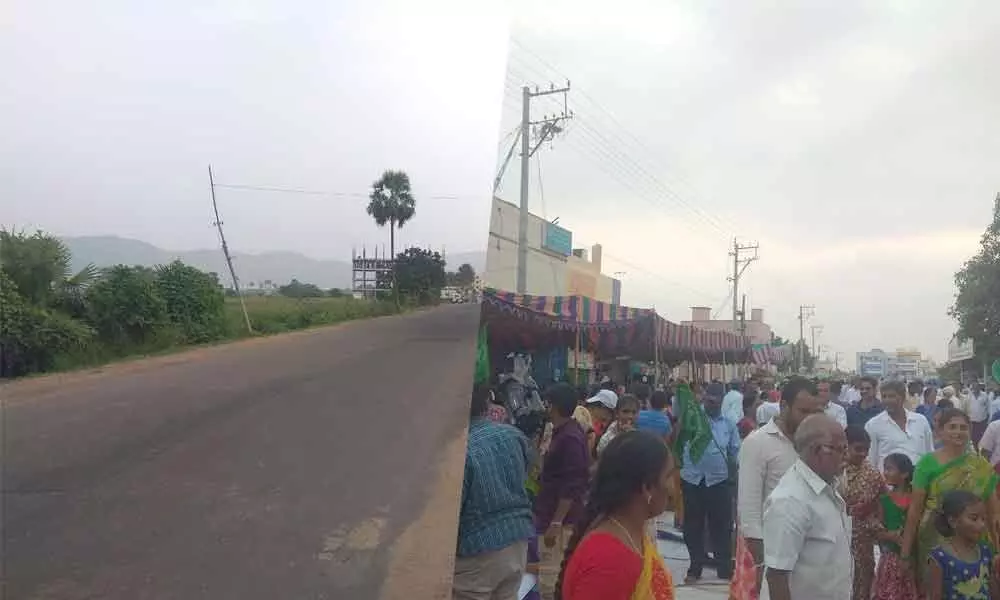Live
- Golden Chariot Luxury Train Revived
- Trying to deflect attention from AAP's failure: JD(U) leader on Kejriwal's letter to CM Nitish
- Advertising Club Hyderabad organises Seminar
- Rahul Gandhi more suitable to be a gym trainer: Acharya Pramod Krishnam
- PM Modi meets 101-year-old former IFS officer, gets a rousing welcome in Kuwait
- Mindful Goddesses: How Women’s Spiritual Development Is Strengthened by Meditation
- Apple CEO Tim Cook Explains Why AI Will Always Be Free for Users
- Venkatesh Daggubati Set to Make Talk Show Debut on Unstoppable with NBK Season 4
- Rashmika ends 2024 on a high
- Aishwarya Sharma pins hopes on ‘Drinker Sai’
Just In
Amaravati farmers caught between devil & deep sea


Say never expected capital city, but now paying a heavy price for no fault of theirs
Amaravati: Five years ago, the twenty-nine villages that are now the key part of Amaravati capital were the best example of Andhra Pradesh's coveted tag of a rice bowl of India, what with lush green agriculture fields and diverse crops presenting a pleasant sight.
The area has since transformed into a solid base for the concrete jungle that has been designed as part of the mega Amaravati capital planned by the previous TDP government.
With Jagan Mohan Reddy-led YSRCP government proposing to set up executive capital in Visakhapatnam instead, these villages and the farmers who gave their land for the capital seem to have landed in an uncharted territory.
And, most of the farmers The Hans India spoke to in Amaravati villages felt that they were paying a heavy price for no fault of theirs.
"Our area is more developed and advanced than East and West Godavari districts when it comes to agriculture. We have fertile lands in which we can cultivate three crops a year.
We used to get Rs 1 lakh to Rs 2 lakh income on every acre of land annually. Now, we have no work to do, nowhere to go thanks to uncertainty over capital city project," lamented Nageswara Rao, a farmer from Velgapudi village, while speaking to The Hans India.
AP's temporary secretariat complex is located near Velgapudi, one of the villages in Amaravati.
Rao handed over six-acres of his prime agriculture land to the Andhra Pradesh government for Greenfield Amaravati capital under the Land Pooling Scheme (LPS) announced by it on January 1, 2015.
Like Rao, nearly 25,000 farmers from 29 villages parted with 34,381 acres of land for AP capital. Of this, 33,000 acres was given within 60 days of announcing the scheme.
Under the scheme, farmers were offered developed plots equivalent to 30 per cent of the land each of them contributed to the scheme.
The government has also been paying yearly compensation for the last five years. As per the agreement, the payment will have to continue for another five years.
"We never yearned for capital city to be located in our area and on our lands. It was the TDP government which approached us, seeking our lands for the capital city.
Now, the YSRCP government is looking to shift the main part of the capital from here after many buildings were constructed and several roads have been laid. That will leave us at crossroads," Rao observed.
The farmer, who got open plots measuring 8,700 square yards in return for his six acres land, maintained that farmers were initially reluctant to give their lands.
"We agreed to give our lands after the issue was discussed in the Assembly and everyone including MLAs from TDP, BJP and YRSCP agreed for the development of this location as AP's capital," he reasoned.
Venkateswara Rao, a farmer from Thullur area, said there would be no use for farmers even if the government returned the land.
"It would be near impossible to bring back these lands into cultivation. The agricultural ecosystem has been destroyed. Farmers can't do anything if the lands are not cultivable," he pointed out.
Puvvada Sudhakar Rao, another farmer who is active in the agitation against shifting of the capital project, also said the land would not be suitable for agriculture use.
"Leaders who are talking on those lines don't aware of the ground realities. Apart from the seed capital access road, 33 internal roads have been completed. All the land has been converted as non-agriculture land.
Small canals, streams and other paraphernalia that is essential for cultivation are no longer there. The government will have to spend lots of funds if the land has to be converted back for agriculture use," he said.
It is to be seen what the AP government will do to alleviate these farmers' plight if it sticks to its proposal of setting up executive capital in Visakhapatnam.

© 2024 Hyderabad Media House Limited/The Hans India. All rights reserved. Powered by hocalwire.com






